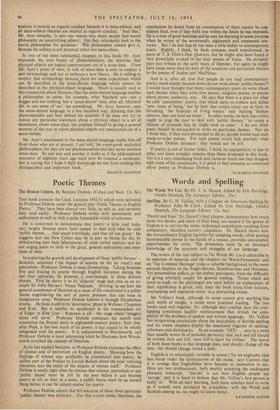Poetic Themes
The Broken Cistern. By Bonamy Dobree. (Cohen and West. 12s. 6d.) This book contains the Clark Lectures 1952-53 which were delivered by Professor Dobree under the general title 'Public Themes in English Poetry.' They have been altered very little, he tells us, and certainly they read easily. Professor Dobree writes with spontaneity and enthusiasm as well as with a quite formidable width of reference.
He is concerned to demonstrate that poetry is little read today very largely because poets have ceased to deal with what he calls 'public themes ... that touch everybody, and that all can grasp.' He suggests that the New Critics may be in part to blame for this by withdrawing into their laboratories of close verbal analysis and for not urging poets to stick to the great, general aspirations and emo- tions of men.
In exploring the growth and development of three 'public themes'— Stoicism, scientism ('the impact of science on the lay mind') and
patriotism—Professor Dobree is most illuminating. Taking Stoicism first and tracing its course through English literature during the last four centuries, he presents it convincingly in three distinct phases. First he shows it in its 'didactic' stage and cites as an ex- ample Sir John Davies's ` Nosce Teipsum.' Striving `to see how the general acceptance of Stoicism as a sense of life constituted it a public theme engendering the sort of poetic pressure that can issue in imaginative verse,' Professor Dobree follows it through Elizabethan drama. He finds it still in its' descriptive' phase in Webster, Chapman and Kyd. But it reaches its apotheosis in the transcendent cry of Edgar in King Lear—` Ripeness is all'—the stage where 'imagery alone will serve.' Professor Dobree continues his search and, examining the Stoical spirit in eighteenth-century poetry, finds that, after Pope, it has lost much of its power; it has ceased to be wholly integrated with the poetry. It is rediscovered in Wordsworth, and Professor Dobree is most interesting when he illustrates how Words- worth enriched the concept of Stoicism.
As he has studied Stoicism, so Professor Dobree examines the effect of science and of patriotism on English poetry. Showing how the findings of science may profitably be transmuted into poetry, he qubtes part of the Preface to Lyrical Ballads about the poet 'carrying sensation into the midst of the objects of science itself.' Professor Dobree is surely right when he stresses that science, patriotism or any 'public theme' must be felt by the poet before it can become poetry at all; so that, in a sense, a public theme must be an inward thing before it can be subject-matter for poetry.
Professor Dobree admits that h;s selection of these three particular `public themes' was arbitrary. For this mason alone, therefore, the
conclusions he draws from an examination of them cannot be, con- sidered final, even if they hold true within the limits he has imposed. He is a man of great learning and he uses his learning to some purpose when he writes of the seventeenth, eighteenth and nineteenth cen- turies. But I do feel that he has been a little unfair to contemporary poets. Rightly, I think, he finds stoicism, much transformed, in parts of T. S. Eliot's Four Quartets, but he might also have found it very powerfully evoked in the later poems of Yeats. He certainly pays just tribute to the early work of Spender, but again he might have made more than he does of the scientism and patriotism themes in the poems of Auden and MacNeice.
And is it, after all, true that people do not read contemporary poetry much simply because poets do not write about 'public themes'? I would have thought that many contemporary poets do write about such themes when they write love poems, religious poems, or poems about power, authority, war. He says that there is a place for what he calls 'uncommon' poetry, that which seeks to explore and define `new vistas of being,' but he feels that critics today are at fault in forsaking the fountain of living waters' and making broken cisterns, that can hold no water.' In other words, he feels that critics ought to urge the poet to deal with 'public themes,' 'to create a climate of criticism that he might wish to enter.' I do not think poets should be persuaded to write on particular themes. Nor do I think that, if they were persuaded to do so, people would read such made-to-order poems. For such poems would lack precisely what Professor Dobree demands: they would not be felt.
if poetry is out of favour today, I think its unpopularity is due to other and more complex reasons than those proposed in this book. Yet it is a very stimulating book and, however much one may disagree with some of his conclusions, it is good to find someone so concerned about poetry as Professor Dobree is.
'ELIZABETH JENNINGS


































 Previous page
Previous page